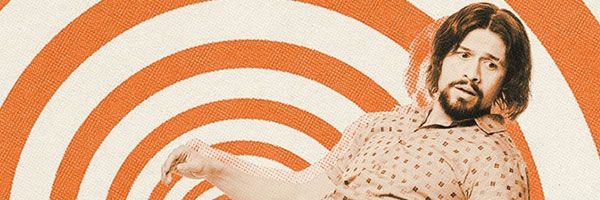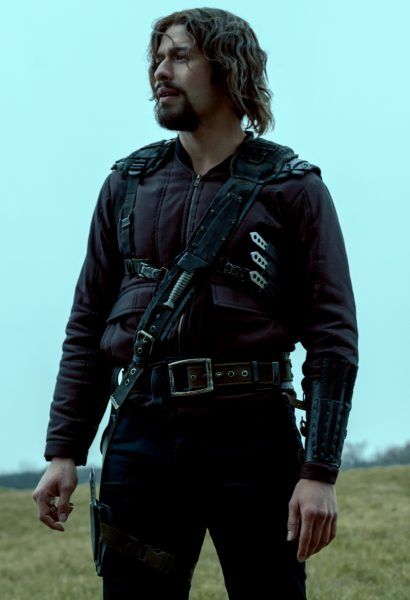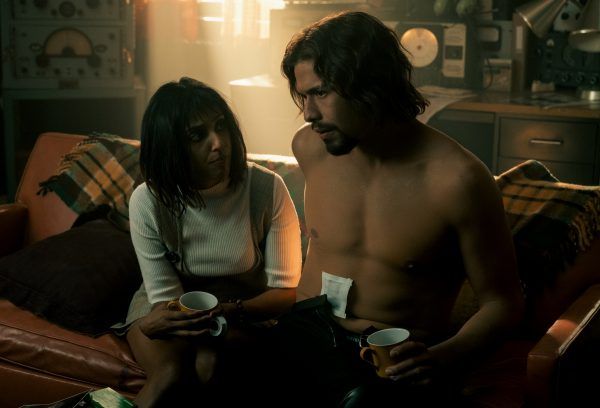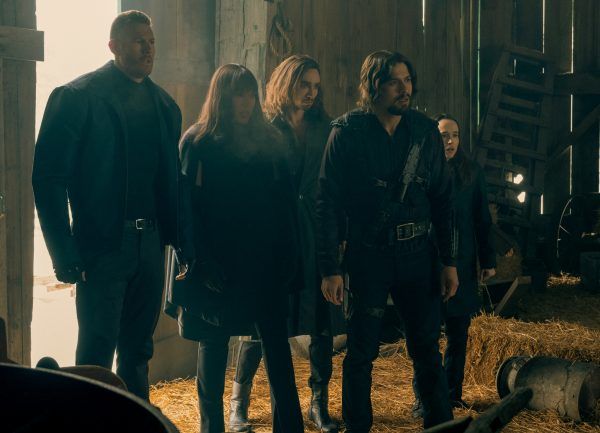[Editor's note: The following contains spoilers through the Season 2 finale of The Umbrella Academy, "The End of Something."]
When it comes to the Umbrella Academy, just because you’ve stopped the apocalypse, it doesn’t mean that you’ve actually saved the world. Jumping time and finding themselves scattered in and around Dallas, Texas, over a three-year period starting in 1960, has disrupted the timeline and started a doomsday clock. As they work to reunite, figure out what caused the nuclear destruction, find a way to put a stop to it, and return to their present timeline, they must survive assassins, romantic relationships, and a number of other oddities, if they’re going to rebuild their family and make it out alive.
David Castañeda, who plays Diego (the rebellious and impulsive Hargreeves family member that’s also an expert with knives), recently got on the phone with Collider to chat all things Season 2 of the Netflix original series The Umbrella Academy, adapted from the graphic novels by Gerard Way and Gabriel Bá. During this 1-on-1 interview, he talked about building on the first season, whether Diego's new haircut actually made him feel like Antonio Banderas, the effects of the insane asylum on his character, the Diego-Lila (Ritu Arya) relationship, the scene that made him most nervous, and his reaction to learning about the shocking cliffhanger.
Collider: What did you most enjoy about doing the first season of this and exploring the introduction of this world, and then how did it feel to return to it and build on that for the second season?
DAVID CASTANEDA: The first season was more about just proving myself, in terms of working with this incredible cast and the people working behind the camera. I was like, “I just can’t really mess this up.” That was my mentality, throughout the whole thing. And then, for the second season, it was just more about, “Okay, now I understand the character, but I’ve still gotta prove myself.” It was still very similar. I just had more time for Season 2, rather than Season 1. It was six weeks or two months before we started.
Things have definitely evolved quite a bit, hair and wardrobe-wise, in Season 2. Did you have any input into new hairstyles or clothes for your character? And given that Klaus tells Diego that he looks like Antonio Banderas with the long hair, did the long hair make you feel like Antonio Banderas, at all?
CASTANEDA: I felt like Desperado, once or twice, throughout the six months, I’m not gonna lie. I also felt like the Bee Gees. We were promoting the show in London, at the premiere, and Steve [Blackman] had touched on what Season 2 would look like. I think it was a throwaway of, “Long hair, big beard,” but I was like, “Yes, I’m in for that.” If you’re going to come with a Season 2, you’ve gotta give something different. You have to. And I thought it was great. I was all for it.
After everything that your character went through in Season 1, what was it like to then throw him into an insane asylum and figure out the effect that would have on him?
CASTANEDA: He had a lot of time to think about the trauma with his father, I’d say. That was a lot to fester on. Also, I always thought the reason why he was there for so long is because he was a wanted man, so he allowed himself to be there a little bit longer than he should have. He knew that he had a timeline and, if he was to be out, he was going to be running from people, rather than pursuing what he wanted, so he had to get out at the right time. Obviously, Five came in and messed up his plan, in general. I think the insane asylum fits [Diego] pretty well, especially with how violent he can be.
I love that this is a show that still finds time to explore a bit of a romance with him. What did you enjoy about the dynamic between Diego and Lila, and what do you think it is about her that he found himself connecting with so deeply?
CASTANEDA: I think it’s the parallels between the upbringings that they both had. Even though Diego doesn’t find out about any of those things, I think the dynamic of Lila being very spontaneous and how she just reacts to things is very similar to Diego, and Diego notices these things. It allows him to take the reigns of his own emotion, by seeing someone else and being like, “Oh, I’m not alone.” I think the banter between Diego and Lila was credit to the writers and the casting of it. Ritu Arya, who played Lila, is great. She really put me in my place, more than once.
Because you get to do so many wild things on this show, and there are all of the stunts and fights and special effects, have there been any particularly memorable mishaps, either that have happened to you or that you’ve been in a scene for?
CASTANEDA: There are so many. The Mexican consulate — that whole sequence with the dance and the fight, and the heartbreak with Lila and Diego — to me, felt like it was their relationship, in a nutshell. When we shot that hallway fight, I remember Steve had talked about the fight and I felt like I had a lot of responsibility to just be able to do that hallway scene by myself. So, I rehearsed it in this really slim hallway, trying to make sure that I didn’t get hurt nor did the stunt person get hurt. We had about four takes to do that whole hallway fight. That window that gets broken, we only had four windows, so they said, “You better get this long take in four takes.” So, that was a lot of nerves. I don’t think I’ve felt that nervous in awhile, doing that scene. By the second take, we had it.
It seems as though whatever this group did in the past has changed their present, leading to there being no more Umbrella Academy. Now, it’s the Sparrow Academy and we see this unfamiliar group in the shadows. Have you thought about who that group in the shadows are? Do you have your own theories about where all of that could go next?
CASTANEDA: I just know that it’s gonna be bonkers, if they give us another [season]. I remember reading the script and there was a cube, and I thought, “I have a feeling that’s not going to make it into the final draft, but I also really hope that it will,” ‘cause it just opened up a can of questions. With Carmichael being a fish in a male’s body, it just really makes the whole universe berserk. So, that’s what I thought. I was like, “Just give me the cube. Stay with the cube. I want to see what the cube is.” I don’t know. I can’t formulate it because Steve [Blackman]’s mind is all over the place. I’d rather just be surprised, to be honest with you.
How much did you know about the full arc of the season, and how much did you learn as you got each script?
CASTANEDA: The general arc, I kinda knew. I didn’t know how it would end, and by ending, I mean I didn’t know how the entirety of Episode 10 would end, like whether Diego and Lila would end up together, or any of us would die. I had no idea. And Steve didn’t give us the last section, with the Sparrow Academy, until three days before we shot that scene, and it was the last thing we shot, of the season. So, we had no idea how it was going to end, and Steve is very secretive about those things. We take it in like a viewer experience. We read the scripts, almost like we’re fans of it. We’re just like, “What’s going to happen next?”
Did you know that you had a scene that was missing, that you would be getting later, or did you think the season ended in a different way?
CASTANEDA: I had an idea of how it would end, and I thought it was gonna end with the Sparrow Academy. I had no idea that it would be Ben. I had no idea. That shook me. I was like, “Oh, Justin! I thought you were dead, man!”
Once you got to that cliffhanger, did you ask showrunner Steve Blackman about where that could take things next in Season 3?
CASTANEDA: I have my own theories and I would ask Steve, and Steve would be like, “You’ll see. Hopefully, we’ll get another season, and you’ll see.” I’m still waiting to have that talk with him, to see what he’s thinking about, for the next season. Hopefully, we’ll get one, and then you’ll see where it goes. We’ll see. If not, he’ll just have to turn Season 3 into a book.
The first season ended on a big cliffhanger, too. When it comes to storytelling, are you someone who’s a fan of cliffhanger endings?
CASTANEDA: I love it, but I also hate it so much. I remember, for example, I watched Season 3 of Ozark, and that ending got me so hyped, but also so mad. I can only imagine how people feel with things like that, where they’re so excited, but nowadays, you have to wait for another year.
Were there any deleted scenes for your character this season, or was there anything that didn’t make it into the show?
CASTANEDA: No, I don’t think so. Steve is very, very specific on what he wants. That’s one thing that I really love about what he does. He doesn’t use what he doesn’t need. There are certain things that do catch his eye. For example, in Season 1, there was this scene where I had the idea of cracking a raw egg and eating it, and it wasn’t in the script. After a few back-and-forths, they said, “We’ll let you do it for one take, and one take only.” And then, Steve loved it and he was like, “I’ll keep it.” That’s how specific it is. You have to have something that really pops because if not, Steve already has this whole thing planned out, and for the better.
In what ways would you say this character has really challenged you — that’s been different from any other character that you’ve played?
CASTANEDA: The biggest challenge is consistency. You have to be consistent. Hours fluctuate and days fluctuate, but you have to be ready. I saw it as going to school. When things would get really hectic and fast, I never went to an acting conservatory, so I had to treat it as, “All right, I have to learn.” And if things would go really bad for me, on a day, I’d be like, “Well, there goes a day to learn. Onto the next one.”
The family relationships in this show are so odd — do you ever find yourself just taking a moment to take in how odd they can be?
CASTANEDA: No. It’s so funny, we’re so focused on the immediate thing that’s happening in the scene that it’s very truthful. The people on the set make it feel like you’re there. It’s not until you watch it with someone else and they say, “There’s a fish that runs The Commission?!” that I’m like, “Oh, there is. Oh, wow! That’s a good point.” Or, there’s a talking monkey. I don’t think about the fact that this is a weird, strange world that we’re living in. I just see it like we’re living in this world.
The Umbrella Academy Season 2 is available to stream at Netflix.
Christina Radish is a Senior Reporter of Film, TV, and Theme Parks for Collider. You can follow her on Twitter @ChristinaRadish.




